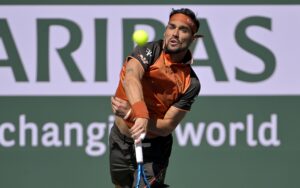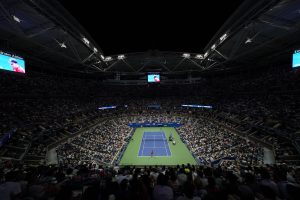Getting into the BNP Paribas Open in Indian Wells as a fan is not simple in 2021.
First of all, let me state for the record that I’m pro-vaccine and pro-showing proof of vaccine. What the US Open did in New York this year, by requiring proof of vaccine, but for the most part, not tying up fans at the gate, should be the model for practicality and public health.
By contrast, the BNP Paribas Open in Indian Wells, CA this October was pushing all fans to download an app at the gate. Why is this step necessary? It’s not “clear”– pun intended.
Here’s my fan experience.
I arrived at an almost empty gate and was asked, not for proof of vaccination, but if I had downloaded the CLEAR Health Pass app on my smartphone.
I had not. The ticket taker asked me to do that on the spot.
But I had a problem. My phone was almost out of juice. It was below 10%. I had friends inside the gates with chargers. But I needed enough battery power on my phone to be able to text them once inside. With a dead phone, no charger, and no way to connect I’d be in a jam. So I asked not to download the app, a request which was met with exasperation. My first thought: Is there a requirement now to have a smartphone in order to attend Indian Wells? I was instructed to go to the white tent off to the side, which I did.
At the white tent, I handed the worker my driver’s license and proof of vaccination card. The worker went to a computer for several minutes before returning and saying I could enter, but she reminded me to download the CLEAR app immediately after I had battery power. She tightly wrapped a purple wristband on my wrist.
“Why so tight?” I asked.
“So you won’t be able to take it off and give it to someone else,” she said in a Judge Judy kind of way. She then walked me over to a sign with a QR code and insisted I take a photo of the code so I could later download the CLEAR app. My thought: Are these people working on commission?
Back at the gate, I walked through something–it was either a biometric screener or a metal detector–can’t be sure. I was then asked by a security guard to empty the contents of my small handbag into a bowl, which I did. The security guard then brought me a clear plastic bag (no connection to the app) and instructed me to put all the contents of my handbag into the plastic bag.
“Why?” I asked.
“Don’t ask. Just do it,” she said pointedly. Not wanting to be a troublemaker, I did as I was told. Once inside the gates, I started to reassemble my handbag (including the female products, lipstick, hairbrush, cash, keys, credit cards, etc.) and the security guard told me I could not do that. I needed to carry around the contents of my purse in the clear plastic bag for the entire day.
Finally free of the gate and security, I quick-stepped to the concession stand, because after all that, I needed a drink. I asked the woman behind the counter about the plastic bags.
“It’s to prevent bombings and shootings,” she told me.
This is what welcomes fans in 2021.
Look, I’m all for making things more safe. I’m even somewhat ok with the bags, though I’d have appreciated a heads-up.
But after some moments of critical thinking, I’m a tad confused about the CLEAR app that was pushed on me.
It turns out that CLEAR is a private company, which has not and does not disclose its financials, per Reuters. It markets its app as a way for fans to save time when entering sporting events, but again, does not disclose what it does with the data.
The really confounding part, again per Reuters, is that the state of California does not allow apps to cross-reference its vaccine records. So the CLEAR app has no way of verifying if vaccine cards are legitimate, at least in California.
What’s the purpose?
The people who run CLEAR just received a new round of funding and boast 5.7 million users. If I had downloaded their app, I’d have added to that total. But I never asked to be a user. I just wanted to go to a tennis tournament.
Again, public health and safety is more important to me than going to a sports event. But with data breaches and digital rel=”noopener” target=”_blank”privacy concerns, at some point we as consumers need to ask what is being asked of us. At the moment, it’s just not clear.





